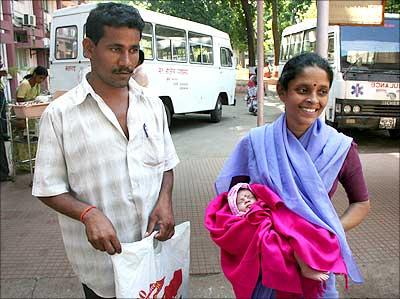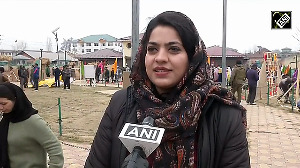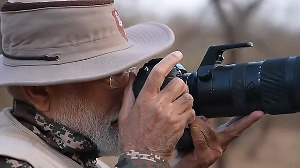 Viju Chauhan, 27, who hails from central Karnataka's Alipur Tanda, works at the Sassoon Dock, a seafood wet dock in Colaba, south Mumbai. She peels freshly-caught prawns for between Rs 50 to Rs 100 a day for a living. But Viju has not been skinning jhinga (prawns) for many days now.
Viju Chauhan, 27, who hails from central Karnataka's Alipur Tanda, works at the Sassoon Dock, a seafood wet dock in Colaba, south Mumbai. She peels freshly-caught prawns for between Rs 50 to Rs 100 a day for a living. But Viju has not been skinning jhinga (prawns) for many days now.
She can be found, instead, at her tiny, 10 foot-by-five foot second floor kholi (room), deep inside the slums facing Cuffe Parade police station, also in south Mumbai.
She sits fresh-faced and calm on the bare floor of her home in a bright lavender sari. On her lap is a tiny, quiet, pink-skinned baby with a mop of unruly black hair. She has petal-soft crumpled little hands and feet. The baby hardly cries; mewls occasionally.
Almost three kilograms at birth, the little girl does not have a name yet. She is a Miracle Baby.
Her father Shamu, 36, who also works at the Sassoon Dock, unloading fish for Rs 100 to 200 a day, when his seth's boats come in and at other times finds casual work, jokes with his son, Sheshikant, 4, to lighten the atmosphere: "We will name her Goli (bullet)."
Little Goli was born at 10.55 pm on November 26.
On that ill-fated evening Viju caught a taxi from the main road in front of her Cuffe Parade home for the Cama and Albless Hospital, about 20 minutes away. She was accompanied by Shamu and Sheshikant. They arrived at the hospital at about 9.10 pm.
Viju was in labour.
Hardly had the registration formalities completed and she was admitted to the third floor of the hospital's more modern pre and post-natal wing, when the sounds of gunshots were heard at the nearby Chhatrapati Shivaji Terminus.
After a dragging, ominous silence, shots were now heard much, much closer.
The Cama and Albless Hospital, located near the CST, faces the large Azad Maidan and can be entered through two large metal gates on Mahapalika Marg (now guarded by numerous policeman). The hospital also has a narrow black, back gate on a lane that leads to the Mumbai police's CID headquarters. Beyond that the lane is the road that leads to CST.
From the ward, the occupants -- staff, relatives and patients -- could see that someone in the dark had vaulted over the back gate and was shooting.
Says Shamu, "A doctor came running up to say that watchman ko goli lag gayi(the watchman had been shot). He shoved us all into the delivery room and said we have to save our lives." All the male relatives, he recounts, were shoved into the back of the delivery ward. Heavy metal cots were piled one onto the other and placed in front of the barricaded door.
After a while they heard the terrorists coming up. Says Shamu: "They were cursing. They were using words like b**** c***, m***** c***. They said 'Doh haramee ko mar diya (we killed two bastards). They shot at the door of the ward. Some glass broke. They banged at it with their guns and then they went on upstairs. They shot every five or ten minutes. They must have been in the building for half an hour. The mama (senior ward boy) in the ward said they were terrorists and asked us to sit quietly. We sat there praying. We were crying. I was crying." He huddled his trembling son close to him and hung on.
Viju was closeted in the small delivery room with five doctors, two nurses, a dai (midwife), her sister and two villagers from her home state, who had fled for their lives from the scene at CST and taken shelter at this ward. Her mind was on her labour pains and she was barely aware of the sounds beyond the windows in the dark night. "I heard some firecrackers."
Her little baby girl was delivered by a nervous but exceptionally brave throng of doctors and nurses over an hour later. She was then told that they were right in the middle of a terrorist attack and that Mumbai was under siege.
Her mattress was dragged to the ground. The lights and fans were turned off and they hunkered down till dawn. "The nurse sat on the floor, cross-legged, the whole night with my baby in her lap."
Shamu had no idea if Viju or their soon-to-be-born baby had survived or perished. "I did not know if she was safe or dead." It was only at 7 am, when it was established that it was safe to move from their hiding places, did Shamu learn with soul-warming, joyous relief that he had a daughter and his wife had come through that terrible night alive and well. He brought Viju and the baby home that afternoon.
He has written out a long letter to the staff, nurses and doctors of Cama hospital, in his mother tongue Kannada, thanking them for what they did for him and his family and delivered photocopies to the hospital last Friday, when he brought a nervous and scared Viju and the little baby for their injections.
"They were such wonderful people. They didn't just save the patients. They made sure the patients's relatives were safe as well. They delivered our baby and saved our lives too," he says with quiet emotion as he holds his 26/11 baby's wee hand.
Image: Shamu Chauhan with his wife Viju and infant Goli outside the Cama hospital. Text: Vaihayasi Pande Daniel. Photograph: Reuben N V






 © 2025
© 2025